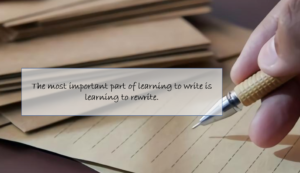
Revision literally means to “see again,” to look at something from a fresh, critical perspective. It is an ongoing process of rethinking the paper: reconsidering your arguments, reviewing your evidence, refining your purpose, reorganizing your presentation, reviving stale prose.
But I thought revision was just fixing the commas and spelling.
Nope. That’s called proofreading. It’s an important step before turning your paper in, but if your ideas are predictable, your thesis is weak, and your organization is a mess, then proofreading will just be putting a band-aid on a bullet wound. When you finish revising, that’s the time to proofread.
Writing is a process of discovery, and you don’t always produce your best stuff when you first get started. So revision is a chance for you to look critically at what you have written to see
- if it’s really worth saying,
- if it says what you wanted to say, and
- if a reader will understand what you’re saying.
Here are several things to do. But don’t try them all at one time. Instead, focus on two or three main areas during each revision session.
| What? | How? |
| Wait a while after you’ve finished a draft before looking at it again. A day—a few hours even—will work. |
When you do return to the draft, be honest with yourself, and don’t be lazy. Ask yourself what you really think about the paper. |
| Look at the big picture |
Use the general Revision Checklist or the specific Peer/Self-editing sheet |
|
Think honestly about your thesis: Do you still agree with it? Should it be modified in light of something you discovered as you wrote the paper? Does it make a sophisticated, provocative point, or does it just say what anyone could say if given the same topic? Does your thesis generalize instead of taking a specific position? Should it be changed altogether? |
|
|
Think about your purpose and your intended reader: Does your introduction state clearly what you intend to do? Will your aims be clear to your readers? |
Review this Determining Audience handout Consider Your Purpose handout |
| Eliminate repeated words (unless it’s intentional). | Do a keyword search (CTRL + F) of your document to determine if repeated words exist |
| Change up your verbs |
Review a list of power verbs to find alternatives. Access this one or use a thesaurus |
|
Does the thesis match what you’ve discovered while writing? Do the arguments to defend your position? Are the examples used to illustrate your points vivid and clear? Does the order of your paper help the reader follow your argument, or to change the emphasis of your points? Would your paper benefit from adding or deleting material for balance or emphasis? |
Use the Writing Techniques handout to help you revise to answer any of these questions. |
Check out The Writing Commons for tons of articles on writing and research.
Always have an editor; that is, someone/thing to give you feedback on your writing. Here are some options:
Ways to acquire feedback on your writing
- Teacher feedback
- Peer Editing Sheet
- Hemingway app (screenshot)
- Grammarly (screenshot)
- PaperRater (link from summary report)
AND for great tips on correcting grammatical errors that your feedback techniques give you check out The Grammar Girl’s Quick and Dirty Tips.
